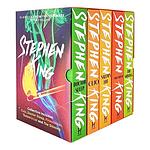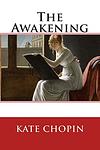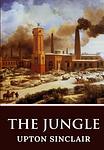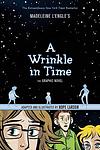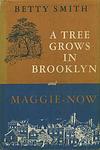The Greatest American Books of All Time
Click to learn how this list is calculated.
This list represents a comprehensive and trusted collection of the greatest books. Developed through a specialized algorithm, it brings together 286 'best of' book lists to form a definitive guide to the world's most acclaimed books. For those interested in how these books are chosen, additional details can be found on the rankings page.
Genres
Countries
Date Range
Reading Statistics
Click the button below to see how many of these books you've read!
Download
If you're interested in downloading this list as a CSV file for use in a spreadsheet application, you can easily do so by clicking the button below. Please note that to ensure a manageable file size and faster download, the CSV will include details for only the first 500 books.
Download-
51. Tender Is the Night by F. Scott Fitzgerald
Set in the French Riviera in the 1920s, the novel traces the tragic tale of a young psychiatrist, his beautiful wife, and the drama that unfolds amongst their circle of wealthy expatriate friends. The psychiatrist's wife suffers from mental illness, which leads to his own downfall as he struggles to keep his marriage intact and maintain his professional reputation. The narrative explores themes of wealth, love, desire, and the destructive power of obsession, painting a haunting portrait of the dark side of the glamorous Jazz Age.
-
52. The Double Helix: A Personal Account of the Discovery of the Structure of DNA by James D. Watson
This book is a personal account of the race to discover the structure of DNA, told from the perspective of one of the co-discoverers. It provides an insider's view of scientific research, the collaboration and competition, the dedication, the doubt, the exhilaration of discovery, and the often fraught relationship between science and the rest of life. The book also explores the personalities, quirks, and conflicts of the scientists involved in the groundbreaking discovery.
-
53. All the King's Men by Robert Penn Warren
"All the King's Men" is a political drama that revolves around the rise and fall of a Southern governor, loosely based on Louisiana's Huey Long. The story is narrated by a journalist who becomes the governor's right-hand man, offering an inside perspective on the political machinations, corruption, and personal tragedies that accompany the governor's climb to power. The novel explores themes of power, corruption, and the moral consequences of political ambition.
-
54. The Long Goodbye: A Novel by Raymond Chandler
This novel follows the story of a hard-boiled detective in Los Angeles who becomes embroiled in a complex case when he befriends a drunk named Terry Lennox. After Lennox's wife is found dead, Lennox disappears to Mexico and the detective is left to unravel the mystery. The detective then takes on another case of a missing husband, which becomes intertwined with the Lennox case, leading to a web of deceit, corruption, and murder. The detective's pursuit of the truth leads him through a gritty and corrupt world, testing his resolve and morality.
-
55. Light in August by William Faulkner
Set in the American South during the 1930s, this novel explores complex social and personal issues through the intertwining stories of its characters. The narrative primarily follows a man of ambiguous racial identity on a quest to find his father, a pregnant woman searching for the father of her unborn child, and a disgraced minister attempting to navigate his own moral compass. The book delves into themes of identity, race, and the human struggle for understanding and redemption, all set against the backdrop of the deep-rooted prejudices and social norms of the time.
-
56. Blood Meridian by Cormac McCarthy
Set in the mid-19th century, this novel follows a violent teenager known as "the Kid" as he joins a group of Indian-hunters led by the enigmatic and brutal Judge Holden. The narrative is a gruesome depiction of the lawless American West, filled with philosophical musings, vivid descriptions of the harsh landscape, and brutal, relentless violence. The story explores themes of human nature, morality, and the inherent chaos and brutality of life.
-
57. An American Tragedy by Theodore Dreiser
This classic novel explores the dark side of the American Dream through the story of a young man who, despite his humble beginnings, aspires to climb the social ladder. He becomes involved with two women, one wealthy and one from a working-class background. His ambition and desire for status lead him to commit a crime that ultimately results in his downfall. The novel is a stark examination of the destructive power of unchecked ambition and the moral compromises people are willing to make in pursuit of wealth and status.
-
58. Uncle Tom's Cabin by Harriet Beecher Stowe
This renowned novel provides a harsh critique of American slavery through the story of Uncle Tom, a long-suffering black slave. The narrative follows Tom as he is sold and transported to the harsh South, encountering a variety of characters, both kind and cruel. The novel powerfully explores themes of faith, the immorality of slavery, and the concept of humanity, ultimately contributing to the abolitionist cause and leaving a significant impact on the American perception of slavery.
-
59. Gravity's Rainbow by Thomas Pynchon
Set during the end of World War II, the novel follows Tyrone Slothrop, a lieutenant in the U.S. Army, as he tries to uncover the truth behind a mysterious device, the "Schwarzgerät", that the Germans are using in their V-2 rockets. The narrative is complex and multi-layered, filled with a vast array of characters and subplots, all connected by various themes such as paranoia, technology, and the destructive nature of war. The book is known for its encyclopedic nature and its challenging, postmodernist style.
-
60. A Confederacy of Dunces by John Kennedy Toole
The novel is a comedic satire set in New Orleans in the early 1960s, centered around Ignatius J. Reilly, a lazy, eccentric, highly educated, and socially inept man who still lives with his mother. Ignatius spends his time writing a lengthy philosophical work while working various jobs and avoiding the responsibilities of adulthood. The story follows his misadventures and interactions with a colorful cast of characters in the city, including his long-suffering mother, a flamboyant nightclub owner, a beleaguered factory worker, and a frustrated hot dog vendor.
-
61. Fear and Loathing in Las Vegas: A Savage Journey to the Heart of the American Dream by Hunter S. Thompson
This book is a semi-autobiographical novel that chronicles the adventures of a journalist and his attorney as they embark on a drug-fueled trip to Las Vegas. The narrative is a wild and hallucinatory exploration of the American Dream, filled with biting social commentary and outrageous antics. The protagonist's quest for the American Dream quickly devolves into an exploration of the darker side of human nature, highlighting the excesses and depravities of 1960s American society.
-
62. The Adventures of Augie March by Saul Bellow
"The Adventures of Augie March" is a novel set in Chicago during the Great Depression. The story follows the life of Augie March, a poor but spirited boy growing up in a broken home, as he navigates his way through life. The narrative explores his various jobs, relationships, and adventures, as he constantly seeks his identity and place in the world. His journey is marked by a series of encounters with different people and experiences, each shaping him in unique ways.
-
63. Poems of Emily Dickinson by Emily Dickinson
This collection of poetry encapsulates the works of a renowned 19th-century American poet, known for her unique style and themes. The poems, often characterized by their unconventional punctuation and capitalization, explore a wide range of topics including death, immortality, love, and nature. The poet's introspective and often cryptic style has made her one of the most studied and celebrated figures in American literature.
-
64. The Shining by Stephen King
A recovering alcoholic accepts a job as a winter caretaker at a remote Colorado hotel, hoping the isolation will help him reconnect with his wife and young son, and work on his writing. However, the hotel has a dark history and a powerful malevolent presence that influences him into violence, while his psychic son sees horrific forebodings from both past and future. As the winter weather leaves them snowbound, the father's sanity deteriorates, leading to a terrifying climax.
-
65. The Secret History by Donna Tartt
A group of six classics students at a small, elite Vermont college, led by a charismatic professor, become entranced by the study of Greek culture and decide to recreate a Dionysian ritual, which ends in a tragic accident. The group, bound by their shared secret, begins to unravel as paranoia and guilt take hold. The novel explores themes of beauty and terror, the allure of the esoteric, and the destructive consequences of obsession.
-
66. The Complete Stories of Flannery O'Connor by Flannery O'Connor
This comprehensive collection of short stories showcases the author's exploration of the human condition, particularly in the American South. The stories, known for their dark humor, religious themes, and grotesque characters, delve into the complexities of morality, ethics, and the struggle between good and evil. The author's unique blend of Southern Gothic style and religious allegory creates a vivid portrait of a society grappling with its own contradictions and shortcomings.
-
67. Herzog by Saul Bellow
The novel centers around Moses Herzog, a middle-aged, intelligent yet distressed man who is going through a mid-life crisis. After his second marriage fails, he falls into a state of emotional turmoil and begins writing letters to friends, family, and even famous figures, expressing his philosophical thoughts and personal feelings. His journey of self-discovery and understanding forms the crux of the story. It's a profound exploration of a man's struggle with the complexities of life and his quest for meaning.
-
68. The Awakening by Kate Chopin
"The Awakening" is a novel set in the late 19th century New Orleans, which explores the life of a young woman trapped in societal and marital expectations. She embarks on a journey of self-discovery and independence, defying the norms of her time. The protagonist challenges the traditional roles of women as she seeks personal fulfillment, experiences sexual awakening, and struggles with her desires and responsibilities. The book is a critique of the repressive social norms, particularly regarding women and marriage, of the Victorian era.
-
69. The Jungle by Upton Sinclair
This novel exposes the harsh conditions and exploited lives of immigrants in the United States in Chicago and similar industrialized cities. The protagonist, a young Lithuanian immigrant, works in the meatpacking industry and experiences the extreme poverty, poor working conditions, and lack of social services. The narrative explores the corruption of the American meatpacking industry in the early 20th century and the hardships faced by the working class, leading to significant public outcry that contributed to the passage of the Pure Food and Drug Act.
-
70. The Moviegoer by Walker Percy
The protagonist, a young stockbroker in New Orleans, is alienated, detached, and finds more reality in movies and books than in his everyday life. He searches for meaning in life, often through his relationships with his aunt and his cousin, while also dealing with existential dread and the impending reality of turning 30. This exploration of alienation and search for identity in the modern world won the National Book Award for Fiction.
-
71. U.S.A. Trilogy by John Dos Passos
The U.S.A. Trilogy is a series of three novels that chronicle the lives of various characters in the first half of the 20th century in the United States. The narrative intertwines the stories of twelve characters as they navigate the societal changes and upheavals of the era, including World War I, the Great Depression, and the rise of Hollywood. The author uses a unique narrative technique that combines traditional prose, newspaper-style headlines, biographies, and stream-of-consciousness writing to paint a vivid picture of American life during this period.
-
72. A Wrinkle In Time by Madeleine L'Engle
The novel follows the story of a young girl named Meg Murry, her younger brother Charles Wallace, and their friend Calvin O'Keefe as they embark on a cosmic journey to rescue Meg and Charles Wallace's father. The father, a scientist, has been missing since he discovered a new planet using the concept of Tesseract, which is a wrinkle in time. Guided by three mysterious celestial beings, the children travel across different dimensions, face evil forces, and learn about the power of love and self-sacrifice.
-
73. A Tree Grows in Brooklyn by Betty Smith
This classic novel follows the life of Francie Nolan, a young girl growing up in the slums of early 20th century Brooklyn. The narrative explores her experiences with poverty, her pursuit of education, and her dreams of a better life. The tree in the title serves as a symbol of her resilience and hope, growing and thriving despite the harsh conditions around it, much like Francie herself.
-
74. The Structure of Scientific Revolutions by Thomas Kuhn
This influential book examines the history of science, focusing on the process of scientific revolutions. The author argues that scientific progress is not a linear, continuous accumulation of knowledge, but rather a series of peaceful interludes punctuated by intellectually violent revolutions. During these revolutions, known as paradigm shifts, the old scientific worldview is replaced by a new one. The book also popularized the term 'paradigm shift' and challenged the previously accepted view of science as a steadily progressive discipline.
-
75. The Ambassadors by Henry James
The novel centers around a middle-aged man named Lambert Strether who is sent from New England to Paris by a wealthy widow, Mrs. Newsome, to convince her wayward son, Chad, to return home. However, upon arriving in Europe, Strether is charmed by the sophisticated lifestyle Chad has adopted and finds himself questioning the puritanical values of his homeland. He also becomes entangled in romantic relationships and complex social dynamics, leading him to ultimately question his loyalty to Mrs. Newsome. The book explores themes of morality, identity, and the concept of the American versus European lifestyle.
Reading Statistics
Click the button below to see how many of these books you've read!
Download
If you're interested in downloading this list as a CSV file for use in a spreadsheet application, you can easily do so by clicking the button below. Please note that to ensure a manageable file size and faster download, the CSV will include details for only the first 500 books.
Download












